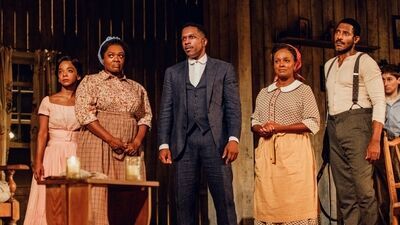(If you know how I can capture my other white whale, that is, the director’s cut of “The Meteor Man,” you’d be doing me a solid. I know most film critics would cite the missing footage from “The Magnificent Ambersons” as their most desired cinematic dream—and I’d like to see that, too. But my white whales skew far more Black-famous.)
A brief history is in order:
By the time Purlie Victorious opened on Broadway on September 28, 1961, Lorraine Hansberry had made Hollywood history with the screenplay adaptation of her seminal play, A Raisin in the Sun. Hansberry became the first Black woman to write a studio picture. Sidney Poitier, who seemed to be in every movie Davis was in at the time, reprised his role as Walter Lee Younger, a role Davis would play after he left the production.
Also, in 1961, Ruby Dee was doing double duty. Not only was she onscreen in Hansberry’s film, reprising her role as Walter Lee’s wife, Ruth Younger, but she was also onstage opposite her husband, Ossie, on the opening night of Purlie Victorious, playing a role he wrote specifically for her country bumpkin Lutiebelle Gussie Mae Jenkins.
Tonally, these two plays have little in common. A Raisin in the Sun is a tense, uplifting family drama presented with the gravitas of Greek tragedy; Purlie Victorious is a boisterous, side-splitting satire pitched as broadly as a barn. But the two plays have more similarities than you think. Both were made into Tony-winning 1970s musicals, Purlie and Raisin, that the original authors had no hand in creating, though Purlie uses so much of Davis’ play that he got a writing credit on it, anyway.
More importantly, the Youngers and Purlie Victorious Judson have the same goal: to buy property in a White neighborhood. And the money needed to do so comes from the death of a family member. For the Youngers, it’s a more affordable house in Clyborne Park whose down payment is meant to come from a $10,000 life insurance policy.
In Purlie’s case, it’s Big Bethel, the church of his youth, where he hopes to start a congregation that includes Lutiebelle, his trickster brother Gitlow (Godfrey Cambridge in his Tony-nominated role), his tough-as-nails sister-in-law, Missy (Helen Martin) and sharp-tongued caretaker Idella (Beah Richards). Big Bethel can be purchased if Purlie can convince Ol’ Cap’n Cotchipee (Sorrell Booke—yes, Boss Hogg), the rich White owner of all the land the Judsons’ sharecrop, to give him a $500 inheritance promised to his aunt’s next of kin, Cousin Bee.

